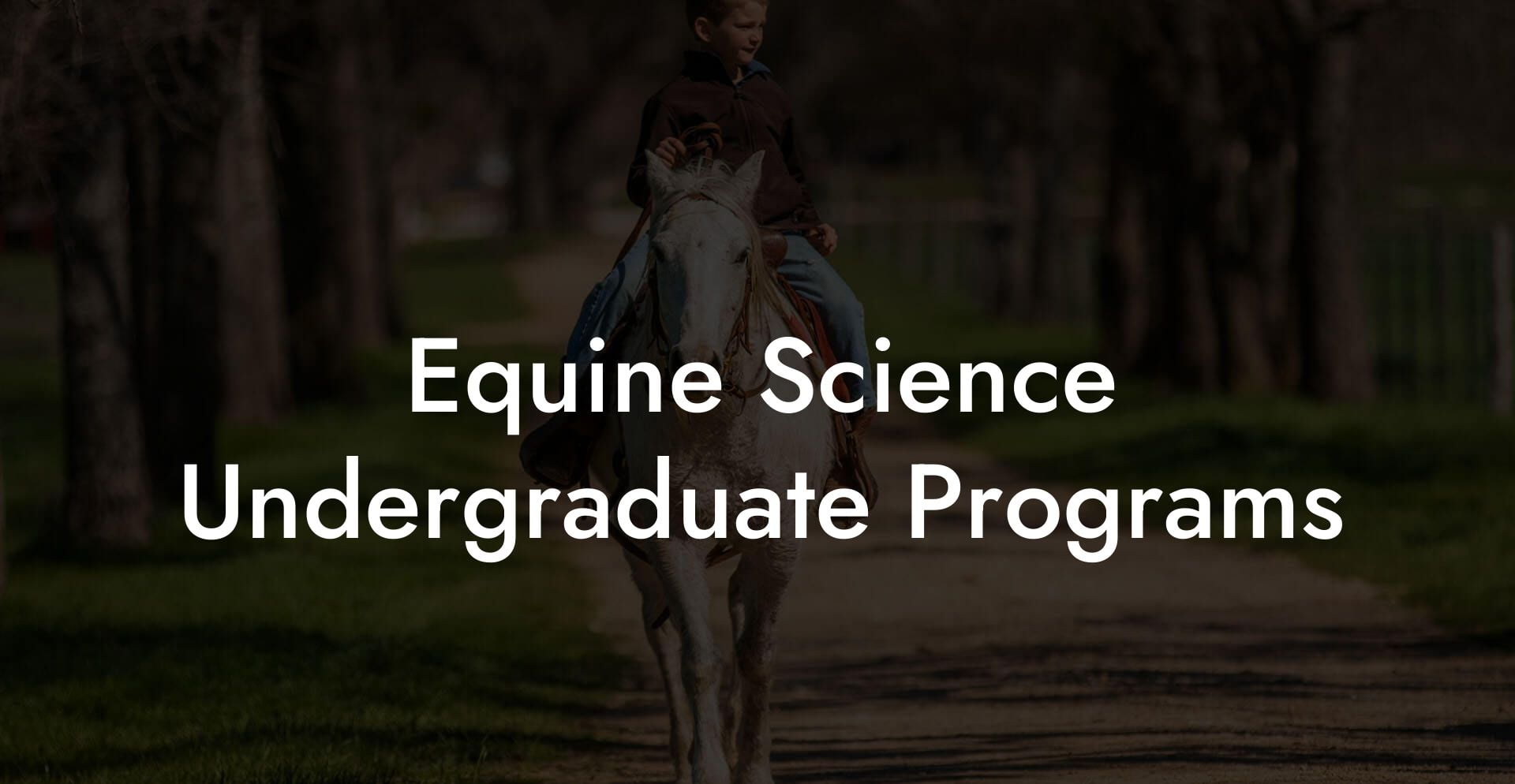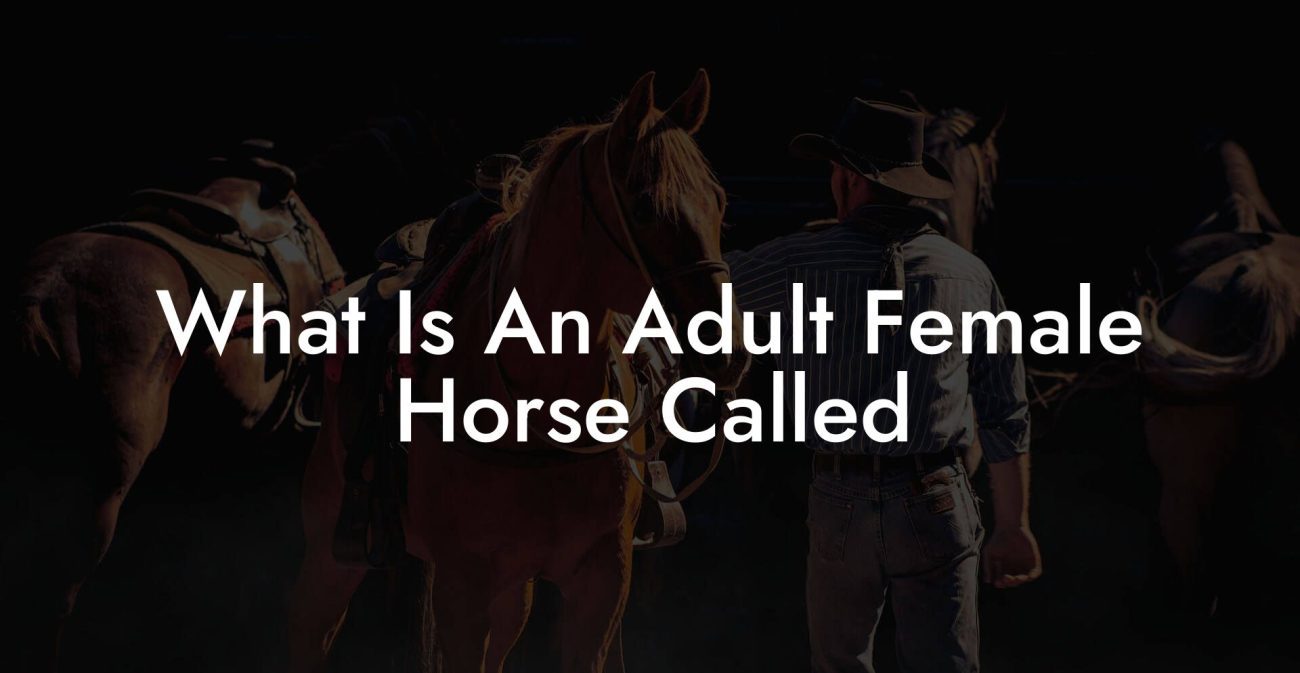Picture yourself deep in the saddle of a vibrant career where your passion for horses meets cutting‐edge academic insight. Equine Science Undergraduate Programs have transformed from dusty textbooks into dynamic gateways that combine hands-on horse care, innovative research, and a community of kindred spirits, all designed with Gen-Z and millennials in mind. Whether you dream of spending your days grooming, riding, and caring for horses or pioneering new practices in equine health and management, these programs offer an immersive, modern spin on tradition.
Quick Links to Useful Sections
- Exploring the World of Equine Science
- Why Choose an Undergraduate Program in Equine Science?
- The Dynamic Curriculum: What to Expect From Your Studies
- Core Coursework
- Specialized Electives
- Hands-On Learning: Internships, Clinics, and Fieldwork
- Meet the Experts: Faculty and Industry Mentors
- Revolutionizing Equine Education with Modern Technology
- Career Pathways: Where Your Degree Can Take You
- Equine Management and Facility Operations
- Equine Health and Wellness
- Research and Development
- Education and Community Engagement
- Student Life: Balancing Books, Barns, and Beyond
- Navigating Admissions: Tips and Tricks for Aspiring Equine Professionals
- Step 1: Research and Compare Programs
- Step 2: Prepare Your Application Material
- Step 3: Ace the Interviews
- Step 4: Explore Financial Aid and Scholarships
- Resources and Community Support: Your Next Steps
- Real Stories: Transformative Experiences in Equine Science
- Case Study 1: Bridging the Gap Between Science and Stable Life
- Case Study 2: From Classroom to Competition
- Case Study 3: Innovating Equine Health With a Digital Twist
- Breaking Down Modern Equine Challenges
- Engaging with the Equine Community: Your Network for Growth
- FAQ: Your Equine Science Questions Answered
- Your Next Step Toward a Fulfilling Equine Science Journey
Exploring the World of Equine Science
Equine science is far more than just learning how to mount a horse; it’s an interdisciplinary field that bridges biology, veterinary science, business, and, of course, the art of horse care. At its core, equine science dives deep into everything you need to know about horses, from their anatomy and nutrition to their behavior and effective management practices.
In today’s fast-paced world, the landscape of equine science has evolved. Gone are the days when a degree meant only stables and long rides across the fields. Modern programs integrate technology, innovative research, and sustainable practices. They prepare you for real-world challenges by blending theory with immediate application, whether that means working with high-performance horses, managing large-scale equestrian facilities, or diving into cutting-edge research on equine nutrition and health.
For those who are equally passionate about animal welfare and academic excellence, equine science programs offer coursework that is profoundly practical and absorbing. And the best part? They provide you with the knowledge and skills necessary to care for horses like the cherished partners they are.
Why Choose an Undergraduate Program in Equine Science?
The decision to pivot your academic journey toward equine science speaks volumes about your dedication to the world of horses. Here’s what makes these undergraduate programs stand out:
- Hands-On Experience: Unlike many traditional degree programs, equine science courses pride themselves on providing abundant practical experience. From grooming clinics to riding lessons and veterinary workshops, you get to learn by doing.
- Interdisciplinary Learning: Integrating biology, animal behavior, business management, and even emerging technologies, these programs ensure that you’re not just a rider but a well-rounded equine professional.
- Community and Networking: Connect with passionate instructors, seasoned professionals, and fellow enthusiasts who share your love for horses. This network can open doors to exciting job opportunities and lifelong friendships.
- Innovative Curriculum: The curriculum is continuously evolving, keeping pace with contemporary research in equine care, advanced diagnostics, and therapeutic riding, making sure that you are ready for the challenges of tomorrow.
- Career Versatility: Whether it’s management, health care, sports performance, or research, a degree in equine science opens up an array of career paths in a multi-billion-dollar industry.
The bottom line? If you’re looking to convert your passion for horses into a vibrant career, equine science undergraduate programs equip you with the foundational expertise and practical know-how needed to succeed in a variety of roles.
The Dynamic Curriculum: What to Expect From Your Studies
An equine science program is as diverse as the horses it studies. From core subjects to specialized electives, the curriculum is designed to be engaging, interactive, and deeply relevant to today’s industry demands.
Core Coursework
The backbone of any equine science program is its core curriculum. Here’s a taste of what you might expect:
- Equine Anatomy and Physiology: Get ready to explore the structure and function of horses, learning details about their musculoskeletal systems, cardiovascular mechanics, and more. This foundational knowledge is indispensable for every equine professional.
- Equine Nutrition: Ever wondered what really goes into a top-notch horse diet? Courses in equine nutrition dive into dietary requirements, supplementation, and the role of diet in maintaining optimal health and performance.
- Horse Behavior and psychology: Understanding why horses act the way they do is critical. Expect to learn about behavioral cues, training methods, and social dynamics within herds.
- Equine Management and Business: Beyond the barn, you’ll study aspects of facility management, event planning, and the business strategies necessary for running a successful equestrian venture.
- Equine Health and Disorders: This course covers common diseases, injury prevention, and the protocols used in rehabilitating ailing horses.
Specialized Electives
As you progress, you can choose electives to tailor your degree to your interests:
- Advanced Equine Therapeutics: Explore non-traditional therapies, from massage and acupuncture to hydrotherapy, that assist in recovery and boost performance.
- Performance Horse Training: Learn the nuances of training horses for competitive sports, focusing on agility, strength, and psychological stamina.
- Equine Genetics and breeding: This course investigates the science behind breeding practices, genetic diversity, and the ethical considerations of equine reproduction.
- Digital Innovation in Equine Science: Embrace technology as you explore data-driven strategies, wearable tech for horses, and innovations in veterinary diagnostics.
These courses are designed to offer a holistic view of equine care, blending theory, research, and direct application to ensure you graduate with both knowledge and confidence.
Hands-On Learning: Internships, Clinics, and Fieldwork
One of the biggest draws of equine science undergraduate programs is the opportunity for immersive, hands-on experience. In a field where practical skills are essential, classroom learning is often just the starting point.
Internships with stables, veterinary clinics, and equestrian centers allow you to work alongside industry professionals. Whether you’re assisting in daily horse care routines, managing barns, or even contributing to state-of-the-art research projects, these internships are vital stepping stones.
Many programs also offer on-campus clinics and fieldwork opportunities. Picture yourself in a dedicated equine center, where you can practice everything from diagnostic techniques to advanced therapeutic riding methods under the close watch of experienced mentors.
Such engagements not only bolster your resume but also provide critical insights into the real challenges and innovations in the field of equine science. By the end of your program, you’ll have a robust portfolio filled with evidence of your commitment to professional growth and excellence in horse care.
Meet the Experts: Faculty and Industry Mentors
The success of any academic program hinges on the quality of its educators and mentors. Equine science programs boast a cadre of accomplished professors with diverse backgrounds, ranging from veterinary medicine and animal nutrition to business management and environmental science. They not only teach but also inspire by sharing industry experiences and guiding innovative research.
In addition to traditional classroom learning, many programs incorporate guest lectures from elite practitioners, veterinarians, experienced trainers, and renowned breeders. This blend of academic and industry-savvy insights creates a learning environment where theory meets practice.
Faculty members often serve as conduits to wider networks within the equine community. Their mentorship can prove invaluable as you navigate internships, research opportunities, and eventually transition into professional roles. They bring a down-to-earth, conversational approach that makes even complex concepts more digestible, ensuring that learning remains as entertaining as it is enlightening.
Revolutionizing Equine Education with Modern Technology
The digital age isn’t just reshaping our social lives, it’s transforming the way we educate and care for horses. Equine science programs have embraced technology to enhance learning, research, and overall equine care practices.
Virtual simulations, digital labs, and wearable tech for horses now play a role in daily coursework. This tech-savvy approach not only helps in monitoring a horse’s vital signs and performance but also aids in early diagnosis and preventive care. Imagine using digital tools to track the health of a competitive racehorse or to analyze the biomechanical movements of a jumping horse in real time.
Moreover, online platforms and remote learning modules allow students to collaborate on projects, share insights, and even connect with equine experts worldwide. In a world where connectivity is key, this fusion of technology and equine science opens up new vistas for advancing the field as well as honing your practical skills.
These digital innovations not only boost your learning experience but also prepare you for a future where technological proficiency is as indispensable as empathy and acumen in equine care.
Career Pathways: Where Your Degree Can Take You
An undergraduate degree in equine science is your first stride into a world full of possibilities. The skills and knowledge you develop pave the way for numerous career paths. Here are some exciting avenues you might explore:
Equine Management and Facility Operations
Whether you dream of running a high-end boarding facility or managing a sprawling equestrian center, your degree gives you the tools to excel in operations, logistics, and business management. You’ll learn the ins and outs of equine facility management, staff coordination, and even event planning, essential for organizing competitions and community events.
Equine Health and Wellness
For those enthralled by veterinary science, opportunities abound in equine health. Many graduates pursue careers in veterinary support, rehabilitation therapy, or work closely with equine sports medicine experts. Your expertise in equine nutrition, behavior, and preventive care can significantly contribute to enhancing a horse’s well-being.
Research and Development
If you’re the inquisitive type, a career in research might be calling your name. Many equine science graduates contribute to studies on equine genetics, disease prevention, and performance optimization. Whether working at research institutions or within the private sector, your findings could revolutionize how we care for horses.
Education and Community Engagement
Sharing your knowledge with others is another rewarding avenue. Graduates often find roles as educators, trainers, and community outreach coordinators in various equine centers, helping spread awareness about best practices in horse care and management.
The versatility of this degree means that whether your passion lies in hands-on equine care, behind-the-scenes management, or pioneering research, there’s a niche perfectly aligned with your aspirations.
Student Life: Balancing Books, Barns, and Beyond
Not only is the academic journey rigorous, but it’s also packed with opportunities to experience life as a modern equine enthusiast. Colleges hosting these programs frequently provide state-of-the-art facilities, stables, and specialized labs where you can immediately apply what you learn.
Campus life in equine science is vibrant and social. Whether it’s partaking in riding competitions, assisting at local horse shows, or simply spending weekends at a nearby stable, you’ll find that learning extends beyond the classroom. Campus events, club activities, and specialized workshops connecting students with industry pros make every day an adventure.
And for those who like to keep things real and relatable, these programs foster a tight-knit community where you swap not only study tips and internship leads but also share your favorite horse memes, care hacks, and even a laugh over the quirks of horse behavior. This supportive network often becomes a second family, encouraging you to balance academic rigor with genuine passion.
Navigating Admissions: Tips and Tricks for Aspiring Equine Professionals
Ready to saddle up and embark on this academic adventure? Here are some practical tips to help you navigate the admissions process and secure your spot in a top-notch equine science program:
Step 1: Research and Compare Programs
The equine science field is booming, and many institutions now offer specialized undergraduate courses. Take time to explore various programs online, comparing curricular offerings, campus facilities, internship opportunities, and even student testimonials. Look for programs that emphasize hands-on learning, state-of-the-art equine centers, and robust industry connections.
Step 2: Prepare Your Application Material
Ensure that your application stands out by showcasing your unique passion for horses. Highlight any experience in horse care, volunteering at stables, or even personal riding endeavors. Letters of recommendation from mentors, trainers, or previous educators can add significant weight.
Step 3: Ace the Interviews
Many programs conduct interviews to assess your genuine interest in the equine field. Be prepared to discuss your past experiences, future aspirations, and why you believe an equine science degree is the right fit for you. Authenticity, passion, and a willingness to learn can make a memorable impression.
Step 4: Explore Financial Aid and Scholarships
Look into scholarships and grants offered by equine associations, foundations that support animal welfare, and your prospective college’s own aid programs. Many institutions are eager to support passionate students committed to making a difference in the equine world.
With the right preparation and a genuine demonstration of your passion, you’ll be well on your way to joining a community that values innovation, hands-on experience, and a lifelong commitment to horse care.
Resources and Community Support: Your Next Steps
Transitioning into an equine science degree is as much a journey of self-discovery as it is an academic pursuit. Fortunately, you don’t have to ride this trail alone. Here are some invaluable resources and community support mechanisms to help you along the way:
- Professional Associations: Organizations like the American Association of Equine Practitioners (AAEP) or local equine clubs offer workshops, conferences, and a chance to network with industry leaders.
- Online Communities and Forums: Platforms such as equestrian Facebook groups, Reddit’s r/equine, and specialized forums allow you to share experiences, exchange tips, and find study partners or mentors.
- Workshops and Clinics: Stay on top of emerging trends by attending seminars, webinars, and hands-on workshops conducted by equine science experts.
- University Support Services: Many colleges offer tutoring, career counseling, and mental health services to help you manage the academic and personal challenges of your course.
- Local Stables and Riding Clubs: Joining a local riding club can provide you with real-world experience, personal mentorship, and even potential internship opportunities that complement your academic learning.
Whether you’re looking for academic support, industry insights, or simply a community that shares your passion, these resources are your next steps toward turning your aspiration into a rewarding career.
Real Stories: Transformative Experiences in Equine Science
Nothing speaks louder than real-life experiences from those who’ve trotted down this path before you. Here are a few inspiring stories of how equine science undergraduate programs have made a lasting impact:
Case Study 1: Bridging the Gap Between Science and Stable Life
Sarah, a recent graduate, always had a knack for caring for horses but craved an academic edge in her approach. Enrolling in an equine science program allowed her to merge her natural talent with state-of-the-art research in equine nutrition and health. Through hands-on internships and a curriculum that balanced scientific theory with practical training, Sarah now plays a pivotal role in a high-performance equestrian center where she designs personalized care regimes for top riding horses.
Case Study 2: From Classroom to Competition
Michael’s passion was evident from a young age. After years of competing in local horse shows and helping out at his family’s stable, he decided to formalize his knowledge through an equine science degree. His program not only offered rigorous academic courses but also provided opportunities to collaborate with professional trainers and veterinarians. Today, Michael is an integral part of an elite team preparing horses for national competitions, his academic background giving him the strategic edge he’d always dreamed of.
Case Study 3: Innovating Equine Health With a Digital Twist
For tech-savvy Emma, blending a love for horses with a passion for digital innovation was the ultimate dream. Through her equine science studies, she gained insights into biostatistics, digital diagnostics, and modern health-monitoring techniques. This unique skill set led her to work on developing wearable technology for horses that can track vital health metrics in real time, a breakthrough that is transforming preventative care in the equine industry.
These stories highlight that an equine science degree is not just academic; it’s a life-changing journey that empowers you to innovate, lead, and make a meaningful contribution to the world of horse care.
Breaking Down Modern Equine Challenges
Today’s equine world is as dynamic as it is demanding. With evolving standards in animal welfare, breakthroughs in veterinary medicine, and the integration of digital technologies, the challenges, and opportunities, are continually shifting. In equine science programs, you’ll learn how to adapt to these changes with agile thinking and ingenious problem-solving strategies.
From fighting the impacts of climate change on pasture management to using data analytics to spot early signs of disease, modern equine challenges require future professionals who are as tech-savvy as they are compassionate. By mastering sophisticated research tools and innovative care methods during your studies, you’ll be poised to tackle issues head-on and devise cost-effective, sustainable solutions that elevate the standard of horse care.
Whether it’s the influence of new nutritional research or the promise of digital transformation in the equine field, you’ll be part of a vibrant, evolving dialogue that reshapes how we understand and care for horses today and tomorrow.
Engaging with the Equine Community: Your Network for Growth
A supportive network is the backbone of success in any field, and equine science is no exception. As you embark on your academic journey, you’ll find yourself constantly connecting with peers, mentors, and industry experts who share your passion and drive.
Social media platforms, specialized online forums, and university clubs offer countless ways to engage with the equine community. Attend webinars hosted by leading equine scientists, join local meetups, and don’t hesitate to ask questions in online Q&A sessions. These interactions not only enhance your learning but can also lead to internships, job offers, and collaborative research projects that further illuminate your career path.
Cultivating these relationships early on can create a dynamic network that supports you throughout your career. Whether you’re troubleshooting a tricky case, brainstorming solutions for emerging industry challenges, or simply sharing a laugh over the quirks of horse life, this community is your lifelong resource.
FAQ: Your Equine Science Questions Answered
Curious about the details of pursuing an equine science undergraduate program? Here are some of the most frequently asked questions along with clear, concise answers to help you make an informed decision.
1. What is an equine science undergraduate program?
An equine science undergraduate program is an academic course of study that covers various aspects of horse care, management, biology, and business. Students gain a well-rounded education that combines theoretical knowledge with practical, hands-on experiences.
2. What core subjects will I study?
The curriculum typically includes equine anatomy and physiology, nutrition, behavior, health disorders, management, and specialized electives like advanced equine therapeutics and digital innovation in horse care.
3. How important is practical experience in these programs?
Extremely important! Practical experience through internships, fieldwork, and on-campus clinics is integral to the curriculum. It prepares you for the real-world challenges of managing, caring for, and treating horses.
4. Are there career opportunities after graduating with an equine science degree?
Absolutely. Graduates can pursue a range of careers, from equine management, health care, and research to education and digital innovation in equine care.
5. What kind of facilities do these programs offer?
Many programs are housed in state-of-the-art facilities, complete with equine centers, modern stables, research labs, and simulation centers to ensure that students have access to all the tools necessary for a hands-on learning experience.
6. How is technology integrated into equine science studies?
Modern programs integrate virtual simulations, digital diagnostics, wearable technologies for horses, and data-driven approaches to bridge theoretical knowledge with real-world applications.
7. Can I get involved with the equine community while studying?
Yes! Equine science programs offer ample opportunities for networking, through internships, professional organizations, online forums, and campus clubs dedicated to equine studies.
8. What should I consider when choosing a program?
Research each program’s curriculum, reputation, available facilities, internship opportunities, and the expertise of its faculty. Look for programs that match your personal interests and career aspirations.
Your Next Step Toward a Fulfilling Equine Science Journey
Embarking on an equine science undergraduate program means turning your passion for horses into a lifelong vocation filled with adventure, innovation, and professional fulfillment. These programs encapsulate not only the academic rigor required to excel in equine management and veterinary health but also the heart and soul of horse care.
Every course you take, every internship you complete, and every new connection you forge will help you build a unique skill set that stands out in the competitive equestrian world. Whether it’s developing new nutritional plans, pioneering digital advances in equine health, or simply perfecting the art of horse grooming, you will cultivate both your professional abilities and your personal passion.
The journey may be challenging, but it is equally rewarding. With a blend of hands-on experience, academic excellence, and modern technology, equine science programs are your gateway to a vibrant future where your love for horses truly comes alive.
So, saddle up, embrace innovation, and launch your career in equine science with confidence and excitement. The barn doors to a world of opportunity are wide open, step through them and let your passion for horse care guide the way.













